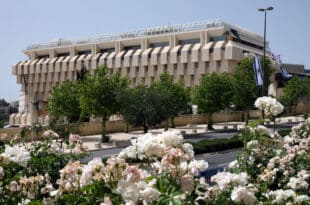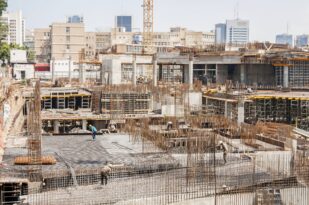The new construction market took a sharp hit in April, following the Bank of Israel’s new restrictions on financing perks offered by developers. According to Ministry of Finance data, just 1,500 new contractor-built apartments were sold on the open market during the month. Early figures suggest that the downward trend continued into May. Meanwhile, the second-hand market saw a more modest drop of around 5%.
By Nimrod Buso, Nadlan Center
According to the monthly residential real estate review published by the Ministry of Finance’s Cheif Economist Division, in April 2025, a total of 6,254 apartments were purchased across Israel. This marks a 15% drop compared to April of last year and ranks as one of the lowest April sales volumes since the early 2000s. When excluding government-subsidized deals, the number of transactions fell even further to 5,433, revealing an annual decline of 20%.
Contractor sales in April totaled 2,364 apartments, including government-subsidized units, a 28% decrease compared to the same period last year. Excluding subsidized deals, sales in the open market declined to just 1,543 units, representing a sharp year-over-year drop of 43%. The report also noted that preliminary figures for May sales indicate a continued decline in the new construction market. Similar declines were recorded earlier in the year, with January through March showing drops of 20% to 30% in new construction sales on the free market. According to the Ministry’s analysis, “It is reasonable to assume that the deepening decline in free-market contractor sales in April–May was at least partially due to the implementation of Bank of Israel restrictions on the scope of financing perks offered by developers.”
The data also revealed a sharp drop in the number of purchases involving financing perks in April, particularly in regions where such offers had previously been widespread. “For example,” the report noted, “in the Netanya area, the share of transactions that included financing benefits for apartments with 12 months or more until delivery fell from between 55% and 65% in the preceding two months to just 30% in April.” Similar steep declines were recorded in Tel Aviv, Be’er Sheva, and Hadera, with drops ranging from 12%-19%.
Contractors’ actual cash flow from new construction sales in April—based on VAT-reported transactions before deducting inputs—reached NIS 6.3 billion, a figure the Ministry of Finance described as “exceptionally high compared to potential cash flow.” This came despite a sharp drop in sales compared to the previous year. In fact, actual cash flow was 37% higher than in April 2024, a trend that may be partly explained by the greater use of financing perks at that time.
The review added: “It’s possible that the sharp drop in sales this April and the continued impact of Bank of Israel limitations prompted at least some companies to accelerate payment collections from clients. Additionally, the data show that this cash flow growth was concentrated among a relatively small number of firms (fewer than 20) that reported unusually high cash inflows not explained by a corresponding rise in sales.”
Investors Buying Less, But Still Selling
The second-hand market also saw a decline, though far less severe than in the new home sector. In April, second-hand apartment sales totaled 3,890, marking a 5% decrease compared to April of last year. “Nonetheless, this still reflects a low level of activity by multi-year standards for this segment in April,” the report noted.
Investor purchases in April totaled 855 apartments, which is a 27% drop compared to April 2024.Investor purchases made up 14% of total purchases, down 1.5% from the previous month and 2% from a year earlier. Investor sales, by contrast, reached 1,269 apartments—virtually unchanged from April 2024. As a result, approximately 420 investment apartments were removed from the rental stock in April.
It’s worth noting that the phase-out of financing perks likely had a significant impact on the investor sector. According to the report, “Only 36% of the apartments purchased by investors in April were new units,” marking a drop of 9% from the previous month and 11% less than in April of last year.
First-time buyer purchases in April totaled 3,655 apartments, including subsidized units, reflecting a 10% year-over-year decline. Excluding subsidized purchases, this segment saw a steeper drop of 19%.
Upgrader purchases totaled 1,744 apartments, a drop of 18% compared to April 2024. This followed an increase in purchases by this group in the first three months of the year. The share of “downsizers” stood at 25%, a 3% drop compared to March, but 3% more than April last year.

Nadlan Center is Israel’s leading real estate news and knowledge platform in Hebrew, created for industry professionals. Founded by experts in the field, it delivers in-depth, up-to-date coverage on urban renewal, planning and construction, taxation, and housing policy — tailored to the needs of developers, investors, planners, and financiers. In addition to its widely read news content, Nadlan Center hosts major industry events, professional conferences, and training programs that support the growth and development of the Israeli real estate sector.
Learn more: https://www.nadlancenter.co.il







